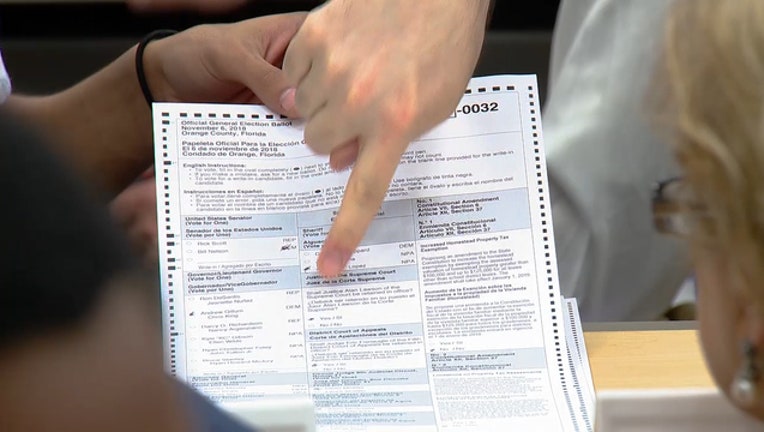State wants ballot signature lawsuit tossed

TALLAHASSEE, Fla. (NSF) - Arguing an omnibus elections bill signed by Gov. Ron DeSantis last week makes the case moot.
Lawyers for the state are asking a federal judge to throw out a lawsuit challenging how Florida elections officials handle mismatched signatures on mail-in and provisional ballots.
Lawyers representing former U.S. Sen. Bill Nelson and Florida and national Democrats filed the lawsuit last fall in anticipation of a statewide recount in Nelson's re-election campaign against former Republican Gov. Rick Scott, who eventually won the Senate race.
The legal challenge stemmed from part of Florida's elections law that required signatures on mail-in and provisional ballots to match signatures on file with elections offices. It also stemmed from the process to "cure" signature mismatches.
Siding with Nelson and the Democrats, Walker issued a preliminary injunction and gave voters extra time to "cure" their ballots.
"The precise issue in this case is whether Florida's law that allows county election officials to reject vote-by-mail and provisional ballots for mismatched signatures --- with no standards, an illusory process to cure, and no process to challenge the rejection --- passes constitutional muster. The answer is simple. It does not," Walker wrote in a November order.
In part to address Walker's ruling, the Legislature included changes to the ballot-signature law in a sweeping elections package passed this spring. DeSantis signed the measure (SB 7066) on Friday.
The lawsuit continued after the preliminary injunction was issued, but Walker put it on hold after the bill passed in May. He ordered both sides to respond within 10 days after the governor acted on the bill.
On Monday, lawyers for Attorney General Ashley Moody and Secretary of State Laurel Lee filed a motion asking the judge to dismiss the case, arguing that the new law "alters Florida's signature-matching processes in a way that resolves the issues" raised in the complaint and in Walker's November order.
The new law changes the process in at least four ways that address the issues, the state's attorneys wrote in Monday's 20-page motion.
First, the law "creates a uniform standard" for county canvassing boards to use in deciding whether signatures match. Any doubt about whether signatures match "must be resolved in favor of counting the vote," and ballots will be rejected only if there is "reasonable doubt" a ballot signature does not match the one on file with the elections office, the state's lawyers wrote.
The new law also requires supervisors of elections and county canvassing board members to undergo "formal signature matching training," to be provided by Lee's office.
"This training will ensure that Florida's uniform standard for accepting vote-by-mail and provisional ballots is applied accurately and consistently throughout the state," the state's lawyers wrote.
The new law also changes the procedures and deadlines for voters to "cure" signature mismatches, the state argued.
For example, when signatures on mail-in or provisional ballots do not match the signatures on file, supervisors must "as soon as practicable" notify the voters of the discrepancy by email, text message or phone, in addition to notice by mail.
Under the new law, voters will have until 5 p.m. on the second day after the election to submit a "cure affidavit." And, if the signature on file does not match the signature on the affidavit, the ballot will be counted if the voter submits certain types of identification.
Finally, the state's lawyers argued, the new law modifies election-contest provisions to allow courts to consider identification provided by the voters with the cure affidavits, in addition to the signatures provided.
The law makes the plaintiffs' "procedural due process claim" moot because "it challenges alleged flaws in Florida's cure provisions that no longer exist," the state's lawyers wrote.
The plaintiffs, which include the Democratic Executive Committee of Florida, had identified three categories of voters who were allegedly denied due process under the old law, based on their inability to cure signature mismatches: voters whose mail-in ballots were submitted after the cure deadline, those who were notified of a signature discrepancy after the "cure" deadline had passed and voters who cast provisional ballots.
"By virtue of SB 7066, those three concerns no longer implicate a justiciable case or controversy," the state argued.
Voters can't submit a mail-in ballot after the cure deadline because the new deadline is after the second day after the election, and mail-in ballots must be received by 7 p.m. on Election Day, the lawyers wrote. And "there is no reason to expect" that voters who mail in their ballots won't have enough time to cure mismatched signatures, because of a variety of changes in the new law, including the notice requirements, they added.
"Properly administered, these provisions will ensure that vote-by-mail voters are notified of a signature mismatch before the cure deadline," the lawyers wrote.
And, while the old law did not have a way for voters who cast provisional ballots to cure signature mismatches, the new law includes a process identical to the one for mail-in ballots, the state argued.
Reached by telephone Tuesday, Uzoma Nkwonta, a lawyer who represents the plaintiffs, said he could not comment on the case.

